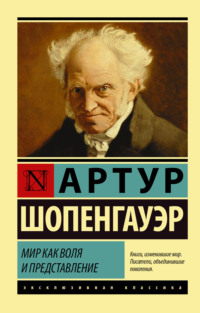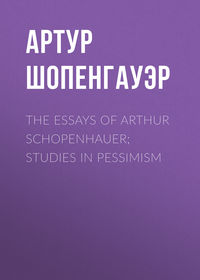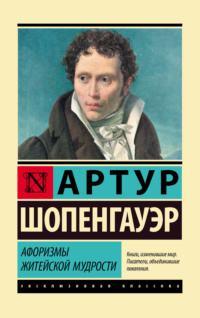 полная версия
полная версияThe World as Will and Idea (Vol. 1 of 3)
Now as ethics was concerned exclusively with right and wrong doing, and could accurately point out the limits of his action to whoever was resolved to do no wrong; politics, on the contrary, the theory of legislation, is exclusively concerned with the suffering of wrong, and would never trouble itself with wrong-doing at all if it were not on account of its ever-necessary correlative, the suffering of wrong, which it always keeps in view as the enemy it opposes. Indeed, if it were possible to conceive an infliction of wrong with which no suffering of wrong on the part of another was connected, the state would, consistently, by no means prohibit it. And because in ethics the will, the disposition, is the object of consideration, and the only real thing, the firm will to do wrong, which is only restrained and rendered ineffective by external might, and the actually committed wrong, are to it quite the same, and it condemns him who so wills as unjust at its tribunal. On the other hand, will and disposition, merely as such, do not concern the state at all, but only the deed (whether it is merely attempted or carried out), on account of its correlative, the suffering on the part of another. Thus for the state the deed, the event, is the only real; the disposition, the intention, is only investigated so far as the significance of the deed becomes known through it. Therefore the state will forbid no one to carry about in his thought murder and poison against another, so long as it knows certainly that the fear of the sword and the wheel will always restrain the effects of that will. The state has also by no means to eradicate the foolish purpose, the inclination to wrong-doing, the wicked disposition; but merely always to place beside every possible motive for doing a wrong a more powerful motive for leaving it undone in the inevitable punishment that will ensue. Therefore the criminal code is as complete a register as possible of motives against every criminal action that can possibly be imagined – both in abstracto, in order to make any case that occurs an application in concreto. Politics or legislation will therefore for this end borrow from that chapter of ethics which is the doctrine of right, and which, besides the inner significance of right and wrong, determines the exact limits between them. Yet it will only do so for the purpose of making use of its reverse side, and regarding all the limits which ethics lays down as not to be transgressed, if we are to avoid doing wrong, from the other side, as the limits which we must not allow others to transgress if we do not wish to suffer wrong, and from which we have therefore a right to drive others back. Therefore these limits are, as much as possible, from the passive side, barricaded by laws. It is evident that as an historian has very wittily been called an inverted prophet, the professor of law is an inverted moralist, and therefore law itself, in its proper sense, i. e., the doctrine of the right, which we ought to maintain, is inverted ethics in that chapter of it in which the rights are laid down which we ought not to violate. The concept of wrong and its negation, that of right, which is originally ethical, becomes juridical by the transference of the starting-point from the active to the passive side, and thus by inversion. This, as well as Kant's theory of law, which very falsely deduces the institution of the state as a moral duty from his categorical imperative, has, even in the most recent times, repeatedly occasioned the very extraordinary error that the state is an institution for furthering morality; that it arises from the endeavour after this, and is, consequently, directed against egoism. As if the inward disposition, to which alone morality or immorality belongs, the externally free will, would allow itself to be modified from without and changed by influences exerted upon it! Still more perverse is the theory that the state is the condition of freedom in the moral sense, and in this way the condition of morality; for freedom lies beyond the phenomenon, and indeed beyond human arrangements. The state is, as we have said, so little directed against egoism in general and as such, that, on the contrary, it has sprung from egoism and exists only in its service – an egoism that well understands itself, proceeds methodically and forsakes the one-sided for the universal point of view, and so by addition is the common egoism of all. The state is thus instituted under the correct presupposition that pure morality, i. e., right action from moral grounds, is not to be expected; if this were not the case, it would itself be superfluous. Thus the state, which aims at well-being, is by no means directed against egoism, but only against the disadvantageous consequences which arise from the multiplicity of egoistic individuals, and reciprocally affect them all and disturb their well-being. Therefore it was already said by Aristotle (De. Rep. iii.): Τελος μεν ουν πολεως το ευ ζην; τουτο δε εστιν το ζῃν ευδαιμονως και καλως (Finis civitatis est bene vivere, hoc autem est beate et pulchre vivere). Hobbes also has accurately and excellently expounded this origin and end of the state; and that old first principle of all state policy, salus publica prima lex esto, indicates the same thing. If the state completely attains its end, it will produce the same outward result as if perfect justice of disposition prevailed everywhere. But the inner nature and origin of both phenomena will be the converse. Thus in the second case it would be that no one wished to do wrong, and in the first that no one wished to suffer wrong, and the means appropriate to this end had been fully employed. Thus the same line may be drawn from opposite directions, and a beast of prey with a muzzle is as harmless as a graminivorous animal. But beyond this point the state cannot go. It cannot exhibit a phenomenon such as would spring from universal mutual well-wishing and love. For just as we found that from its nature it would not forbid the doing of a wrong which involved no corresponding suffering of wrong on the part of another, and prohibits all wrong-doing only because this is impossible; so conversely, in accordance with its tendency towards the well-being of all, it would very gladly take care that every benevolent action and work of human love should be experienced, if it were not that these also have an inevitable correlative in the performance of acts of benevolence and works of love, and every member of the state would wish to assume the passive and none the active rôle, and there would be no reason for exacting the latter from one member of the state rather than from another. Accordingly only the negative, which is just the right, not the positive, which has been comprehended under the name of obligations of love, or, less completely, duties, can be exacted by force.
Legislation, as we have said, borrows the pure philosophy of right, or the doctrine of the nature and limits of right and wrong, from ethics, in order to apply it from the reverse side to its own ends, which are different from those of ethics, and to institute positive legislation and the means of supporting it, i. e., the state, in accordance with it. Positive legislation is thus the inverted application of the purely moral doctrine of right. This application may be made with reference to the peculiar relations and circumstances of a particular people. But only if the positive legislation is, in essential matters, throughout determined in accordance with the guidance of the pure theory of right, and for each of its propositions a ground can be established in the pure theory of right, is the legislation which has arisen a positive right and the state a community based upon right, a state in the proper meaning of the word, a morally permissible, not immoral institution. Otherwise the positive legislation is, on the contrary, the establishment of a positive wrong; it is itself an openly avowed enforced wrong. Such is every despotism, the constitution of most Mohammedan kingdoms; and indeed various parts of many constitutions are also of this kind; for example, serfdom, vassalage, and many such institutions. The pure theory of right or natural right – better, moral right – though always reversed, lies at the foundation of every just positive legislation, as pure mathematics lies at the foundation of every branch of applied mathematics. The most important points of the doctrine of right, as philosophy has to supply it for that end to legislation, are the following: 1. The explanation of the inner and real significance both of the origin of the conceptions of wrong and right, and of their application and position in ethics. 2. The deduction of the law of property. 3. The deduction of the moral validity of contracts; for this is the moral basis of the contract of the state. 4. The explanation of the origin and the aim of the state, of the relation of this aim to ethics, and of the intentional transference of the ethical doctrine of right, by reversing it, to legislation, in consequence of this relation. 5. The deduction of the right of punishment. The remaining content of the doctrine of right is mere application of these principles, mere accurate definition of the limits of right and wrong for all possible relations of life, which are consequently united and distributed under certain points of view and titles. In these special doctrines the books which treat of pure law are fairly at one; it is only in the principles that they differ much, for these are always connected with some philosophical system. In connection with our system, we have explained the first four of these principal points shortly and generally, yet definitely and distinctly, and it remains for us to speak in the same way of the right of punishment.
Kant makes the fundamentally false assertion that apart from the state there would be no complete right of property. It follows from our deduction, as given above, that even in a state of nature there is property with complete natural, i. e., moral right, which cannot be injured without wrong, but may without wrong be defended to the uttermost. On the other hand, it is certain that apart from the state there is no right of punishment. All right to punish is based upon the positive law alone, which before the offence has determined a punishment for it, the threat of which, as a counter-motive, is intended to outweigh all possible motives for the offence. This positive law is to be regarded as sanctioned and recognised by all the members of the state. It is thus based upon a common contract which the members of the state are in duty bound to fulfil, and thus, on the one hand, to inflict the punishment, and, on the other hand, to endure it; thus the endurance of the punishment may with right be enforced. Consequently the immediate end of punishment is, in the particular case, the fulfilment of the law as a contract. But the one end of the law is deterrence from the infringement of the rights of others. For, in order that every one may be protected from suffering wrong, men have combined to form a state, have renounced the doing of wrong, and assumed the task of maintaining the state. Thus the law and the fulfilment of it, the punishment, are essentially directed to the future, not to the past. This distinguishes punishment from revenge; for the motives which instigate the latter are solely concerned with what has happened, and thus with the past as such. All requital of wrong by the infliction of pain, without any aim for the future, is revenge, and can have no other end than consolation for the suffering one has borne by the sight of the suffering one has inflicted upon another. This is wickedness and cruelty, and cannot be morally justified. Wrong which some one has inflicted upon me by no means entitles me to inflict wrong upon him. The requital of evil with evil without further intention is neither morally nor otherwise through any rational ground to be justified, and the jus talionis set up as the absolute, final principle of the right of punishment, is meaningless. Therefore Kant's theory of punishment as mere requital for requital's sake is a completely groundless and perverse view. Yet it is always appearing in the writings of many jurists, under all kinds of lofty phrases, which amount to nothing but empty words, as: Through the punishment the crime is expiated or neutralised and abolished, and many such. But no man has the right to set himself up as a purely moral judge and requiter, and punish the misdeeds of another with pains which he inflicts upon him, and so to impose penance upon him for his sins. Nay, this would rather be the most presumptuous arrogance; and therefore the Bible says, “Vengeance is mine; I will repay, saith the Lord.” But man has the right to care for the safety of society; and this can only be done by interdicting all actions which are denoted by the word “criminal,” in order to prevent them by means of counter-motives, which are the threatened punishments. And this threat can only be made effective by carrying it out when a case occurs in spite of it. Accordingly that the end of punishment, or more accurately of penal law, is the deterrence from crime, is a truth so generally recognised and indeed self-evident, that in England it is expressed in the very old form of indictment which is still served by the counsel for the Crown in criminal actions, for it concludes with the words, “If this be proved, you, the said N. N., ought to be punished with pains of law, to deter others from the like crimes in all time coming.” If a prince desires to extend mercy to a criminal who has justly been condemned, his Ministers will represent to him that, if he does, this crime will soon be repeated. An end for the future distinguishes punishment from revenge, and punishment only has this end when it is inflicted in fulfilment of a law. It thus announces itself as inevitable in every future case, and thus the law obtains the power to deter, in which its end really consists. Now here a Kantian would inevitably reply that certainly according to this view the punished criminal would be used “merely as a means.” This proposition, so unweariedly repeated by all the Kantians, “Man must always be treated as an end, never as a means,” certainly sounds significant, and is therefore a very suitable proposition for those who like to have a formula which saves them all further thought; but looked at in the light, it is an exceedingly vague, indefinite assertion, which reaches its aim quite indirectly, requires to be explained, defined, and modified in every case of its application, and, if taken generally, is insufficient, meagre, and moreover problematical. The murderer who has been condemned to the punishment of death according to law must now, at any rate, and with complete right, be used as a mere means. For public security, the chief end of the state, is disturbed by him; indeed it is abolished if the law is not carried out. The murderer, his life, his person, must now be the means of fulfilling the law, and thereby of re-establishing the public security. And he is made such a means with perfect right, in fulfilment of the contract of the state, which was entered into by him because he was a citizen, and in accordance with which, in order to enjoy security for his life, freedom, and property, he has pledged his life, his freedom, and his property for the security of all, which pledge has now been forfeited.
This theory of punishment which we have established, the theory which is directly supported by sound reason, is certainly in the main no new thought; but it is a thought which was almost supplanted by new errors, and therefore it was necessary to exhibit it as distinctly as possible. The same thing is in its essence contained in what Puffendorf says on the subject, “De Officio Hominis et Civis” (Bk. ii. chap. 12). Hobbes also agrees with it, “Leviathan” (chaps. 15-28). In our own day Feurbach is well known to have maintained it. Indeed, it occurs even in the utterances of the ancient philosophers. Plato expresses it clearly in the “Protagoras” (p. 114, edit. Bip.), also in the “Gorgias” (p. 168), and lastly in the eleventh book of the “Laws” (p. 165). Seneca expresses Plato's opinion and the theory of all punishment in the short sentence, “Nemo prudens punit, quia peccatum est; sed ne peccetur” (De Ira, i. 16).
Thus we have come to recognise in the state the means by which egoism endowed with reason seeks to escape from its own evil consequences which turn against itself, and now each promotes the well-being of all because he sees that his own well-being is involved in it. If the state attained its end completely, then to a certain extent something approaching to an Utopia might finally, by the removal of all kinds of evil, be brought about. For by the human powers united in it, it is able to make the rest of nature more and more serviceable. But as yet the state has always remained very far from this goal. And even if it attained to it, innumerable evils essential to all life would still keep it in suffering; and finally, if they were all removed, ennui would at once occupy every place they left. And besides, the strife of individuals is never completely abolished by the state, for it vexes in trifles when it is prohibited in greater things. Finally, Eris, happily expelled from within, turns to what is without; as the conflict of individuals, she is banished by the institution of the state; but she reappears from without as the war of nations, and now demands in bulk and at once, as an accumulated debt, the bloody sacrifice which by wise precautions has been denied her in the particular. And even supposing that all this were finally overcome and removed, by wisdom founded on the experience of thousands of years, at the end the result would be the actual over-population of the whole planet, the terrible evil of which only a bold imagination can now realise.77
§ 63. We have recognised temporal justice, which has its seat in the state, as requiting and punishing, and have seen that this only becomes justice through a reference to the future. For without this reference all punishing and requiting would be an outrage without justification, and indeed merely the addition of another evil to that which has already occurred, without meaning or significance. But it is quite otherwise with eternal justice, which was referred to before, and which rules not the state but the world, is not dependent upon human institutions, is not subject to chance and deception, is not uncertain, wavering, and erring, but infallible, fixed, and sure. The conception of requital implies that of time; therefore eternal justice cannot be requital. Thus it cannot, like temporal justice, admit of respite and delay, and require time in order to triumph, equalising the evil deed by the evil consequences only by means of time. The punishment must here be so bound up with the offence that both are one.
Δοκειτε πηδᾳν τ᾽ αδικηματ᾽ εις θεουςΠτεροισι, κἀπειτ᾽ εν Διος δελτου πτυχαιςΓραφειν τιν᾽ αυτα, Ζηνα δ᾽ εισορωντα νινΘνητοις δικαζειν? Ουδ᾽ ὁ παρ ουρανος,Διος γραφοντος ταρ βροτων ἁμαρτιας,Εξαρκεσειεν, ουδ᾽ εκεινος αν σκοπωνΠεμπειν ἑκαστῳ ζημιαν; αλλ᾽ ἡ ΔικηΕνταυθα που εστιν εγγυς, ει βουλεσθ᾽ ὁρᾳν.Eurip. ap. Stob. Ecl., i. c. 4.(“Volare pennis scelera ad ætherias domusPutatis, illic in Jovis tabulariaScripto referri; tum Jovem lectis superSententiam proferre? – sed mortaliumFacinora cœli, quantaquanta est, regiaNequit tenere: nec legendis JuppiterEt puniendis par est. Est tamen ultio,Et, si intuemur, illa nos habitat prope.”)Now that such an eternal justice really lies in the nature of the world will soon become completely evident to whoever has grasped the whole of the thought which we have hitherto been developing.
The world, in all the multiplicity of its parts and forms, is the manifestation, the objectivity, of the one will to live. Existence itself, and the kind of existence, both as a collective whole and in every part, proceeds from the will alone. The will is free, the will is almighty. The will appears in everything, just as it determines itself in itself and outside time. The world is only the mirror of this willing; and all finitude, all suffering, all miseries, which it contains, belong to the expression of that which the will wills, are as they are because the will so wills. Accordingly with perfect right every being supports existence in general, and also the existence of its species and its peculiar individuality, entirely as it is and in circumstances as they are, in a world such as it is, swayed by chance and error, transient, ephemeral, and constantly suffering; and in all that it experiences, or indeed can experience, it always gets its due. For the will belongs to it; and as the will is, so is the world. Only this world itself can bear the responsibility of its own existence and nature – no other; for by what means could another have assumed it? Do we desire to know what men, morally considered, are worth as a whole and in general, we have only to consider their fate as a whole and in general. This is want, wretchedness, affliction, misery, and death. Eternal justice reigns; if they were not, as a whole, worthless, their fate, as a whole, would not be so sad. In this sense we may say, the world itself is the judgment of the world. If we could lay all the misery of the world in one scale of the balance, and all the guilt of the world in the other, the needle would certainly point to the centre.
Certainly, however, the world does not exhibit itself to the knowledge of the individual as such, developed for the service of the will, as it finally reveals itself to the inquirer as the objectivity of the one and only will to live, which he himself is. But the sight of the uncultured individual is clouded, as the Hindus say, by the veil of Mâyâ. He sees not the thing-in-itself but the phenomenon in time and space, the principium individuationis, and in the other forms of the principle of sufficient reason. And in this form of his limited knowledge he sees not the inner nature of things, which is one, but its phenomena as separated, disunited, innumerable, very different, and indeed opposed. For to him pleasure appears as one thing and pain as quite another thing: one man as a tormentor and a murderer, another as a martyr and a victim; wickedness as one thing and evil as another. He sees one man live in joy, abundance, and pleasure, and even at his door another die miserably of want and cold. Then he asks, Where is the retribution? And he himself, in the vehement, pressure of will which is his origin and his nature, seizes upon the pleasures and enjoyments of life, firmly embraces them, and knows not that by this very act of his will he seizes and hugs all those pains and sorrows at the sight of which he shudders. He sees the ills and he sees the wickedness in the world, but far from knowing that both of these are but different sides of the manifestation of the one will to live, he regards them as very different, and indeed quite opposed, and often seeks to escape by wickedness, i. e., by causing the suffering of another, from ills, from the suffering of his own individuality, for he is involved in the principium individuationis, deluded by the veil of Mâyâ. Just as a sailor sits in a boat trusting to his frail barque in a stormy sea, unbounded in every direction, rising and falling with the howling mountainous waves; so in the midst of a world of sorrows the individual man sits quietly, supported by and trusting to the principium individuationis, or the way in which the individual knows things as phenomena. The boundless world, everywhere full of suffering in the infinite past, in the infinite future, is strange to him, indeed is to him but a fable; his ephemeral person, his extensionless present, his momentary satisfaction, this alone has reality for him; and he does all to maintain this, so long as his eyes are not opened by a better knowledge. Till then, there lives only in the inmost depths of his consciousness a very obscure presentiment that all that is after all not really so strange to him, but has a connection with him, from which the principium individuationis cannot protect him. From this presentiment arises that ineradicable awe common to all men (and indeed perhaps even to the most sensible of the brutes) which suddenly seizes them if by any chance they become puzzled about the principium individuationis, because the principle of sufficient reason in some one of its forms seems to admit of an exception. For example, if it seems as if some change took place without a cause, or some one who is dead appears again, or if in any other way the past or the future becomes present or the distant becomes near. The fearful terror at anything of the kind is founded on the fact that they suddenly become puzzled about the forms of knowledge of the phenomenon, which alone separate their own individuality from the rest of the world. But even this separation lies only in the phenomenon, and not in the thing-in-itself; and on this rests eternal justice. In fact, all temporal happiness stands, and all prudence proceeds, upon ground that is undermined. They defend the person from accidents and supply its pleasures; but the person is merely phenomenon, and its difference from other individuals, and exemption from the sufferings which they endure, rests merely in the form of the phenomenon, the principium individuationis. According to the true nature of things, every one has all the suffering of the world as his own, and indeed has to regard all merely possible suffering as for him actual, so long as he is the fixed will to live, i. e., asserts life with all his power. For the knowledge that sees through the principium individuationis, a happy life in time, the gift of chance or won by prudence, amid the sorrows of innumerable others, is only the dream of a beggar in which he is a king, but from which he must awake and learn from experience that only a fleeting illusion had separated him from the suffering of his life.









